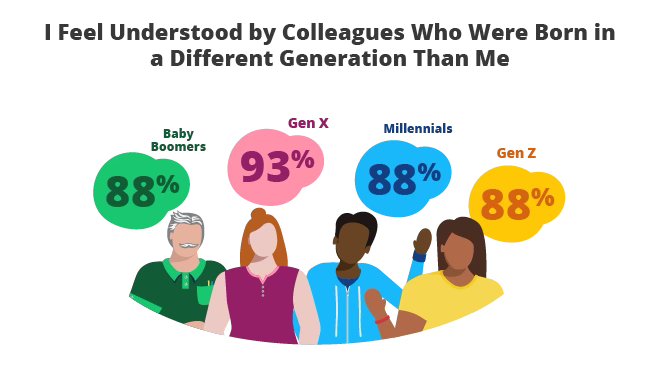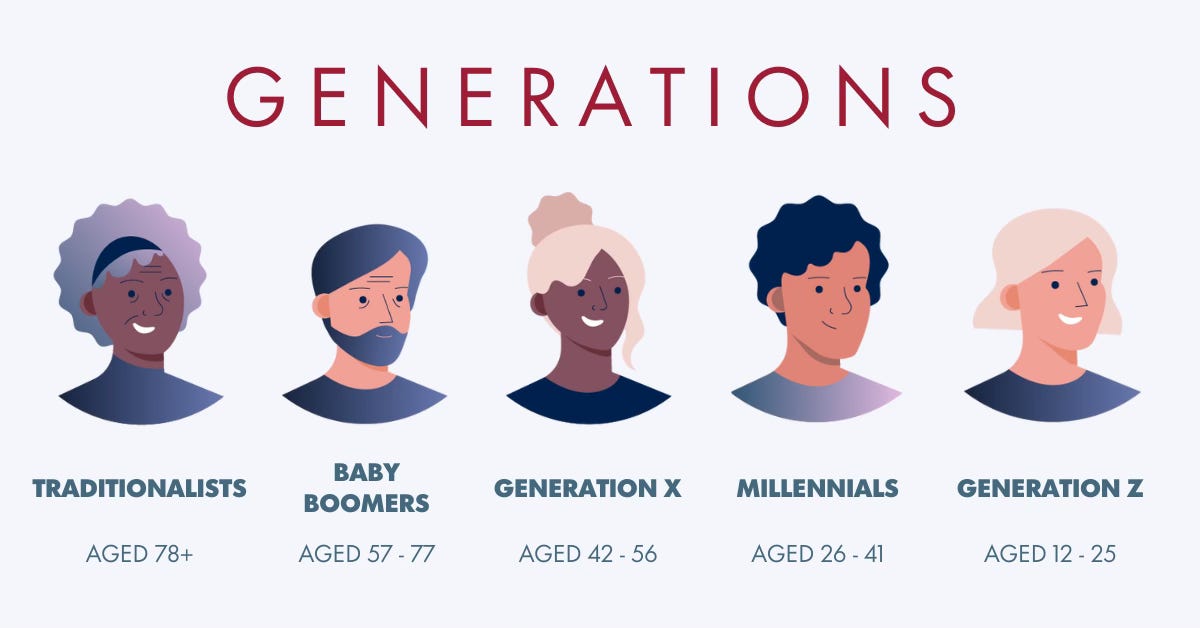The Workplace Generation Game: When Wisdom Meets Innovation
How smart organizations are turning eye rolls into innovation by harnessing the power of five generations under one roof
Every workplace has them: the eye rolls when "the Boomer" suggests another meeting, the sighs when "the Gen Z kid" mentions work-life balance again, the assumptions flying faster than Slack messages. 🙄
I see it everywhere I go. The subtle (and not-so-subtle) generational tensions that simmer beneath the surface of our organizations. The dismissive comments. The tribal mentalities. The missed opportunities for collaboration because we're too busy defending our generational territory.
But here's what we're missing: generational diversity might be our most underutilized organizational superpower.
The Numbers Tell a Compelling Story
The research is crystal clear on this. According to a Cloverpop study that analyzed 600 business decisions across 200 teams, diverse teams, including those with age diversity, make better decisions 87% of the time compared to individual decision-makers. That's not a marginal improvement; that's a game-changer.
While specific studies linking multigenerational workforces to innovation leadership vary in their findings, what's consistent is this: organizations that effectively leverage generational diversity see higher productivity, stronger innovation, and lower turnover rates. A Boston Consulting Group study found that companies with diverse leadership, including age diversity, deliver 19% higher revenue from innovation.
The Complementary Strengths We're Overlooking
Think about what each generation brings to the table:
Boomers bring institutional knowledge and relationship capital built over decades. They've seen economic cycles, industry transformations, and organizational changes that younger workers can only read about. Their networks, built through years of face-to-face relationship building, can open doors that no LinkedIn connection request ever could.
Gen X offers skeptical pragmatism and independent problem-solving from their latchkey years. They're the bridge generation, fluent in both analog and digital worlds. They question everything because they've seen promises broken and companies fold. This healthy skepticism can save organizations from groupthink.
Millennials contribute digital fluency and collaborative approaches shaped by growing up online. They're not afraid to challenge hierarchy because they've seen startups disrupt giants. They value purpose and meaning, pushing organizations to articulate their "why" beyond profit margins.
Gen Z brings fresh perspectives on sustainability, inclusion, and mental health that organizations desperately need. They're not asking for work-life balance as a perk, they see it as a baseline requirement for human dignity. Their activism isn't entitlement; it's a refusal to accept outdated norms.
The Friction Is Real, And That's Okay
Yes, the tension points are real. I've mediated enough generational conflicts to write a book about it:
Older generations sometimes view remote work requests as laziness rather than efficiency
Younger workers might interpret process-heavy approaches as resistance to change rather than risk management
Communication preferences clash, formal emails versus instant messages, scheduled calls versus quick video chats
Feedback expectations differ dramatically, annual reviews versus continuous conversation
But here's what I've learned: friction creates fire, and fire can either burn down the house or forge something stronger. 🔥
The organizations I've seen thrive don't try to eliminate generational differences. They harness them. They understand that when a 25-year-old's fresh perspective meets a 55-year-old's pattern recognition, innovation happens. When digital natives teach established professionals new tools while learning the unwritten rules of organizational politics, everyone grows.
Every Generation Was Once "The Problem"
Here's the truth that makes me chuckle every time generational warfare erupts: every generation thinks the others "don't get it."
Boomers were once the disruptors challenging traditional hierarchy. Time magazine called them the "Me Generation" in 1976, criticizing their self-absorption and rejection of traditional values. Sound familiar?
Gen X was labeled cynical and uncommitted. They job-hopped! They demanded work-life balance! They didn't show proper respect for authority! The horror!
Millennials were "entitled" and "trophy kids" who killed everything from napkins to the housing market, until they became middle managers and suddenly understood why processes exist.
Today's Gen Z "snowflakes" who are "too sensitive" and "unrealistic"? They're tomorrow's industry leaders who will transform how we think about work, just like every generation before them.
Building Bridges, Not Walls
The organizations winning today understand that bridging generational gaps requires intentional effort. Here's what actually works:
Reverse Mentoring Programs: Where younger employees teach technology and social media strategies while learning leadership and organizational navigation. Microsoft reported a 70% increase in team collaboration after implementing cross-generational mentoring.
Mixed Project Teams: Deliberately combining generations on critical projects. One tech company I worked with saw innovation metrics jump 67% after mandating age-diverse teams for product development.
Flexible Recognition Systems: Understanding that public praise might motivate a Millennial while a private note might resonate more with a Gen Xer. One size fits none when it comes to recognition across generations.
Communication Flexibility: Not forcing everyone into one communication style but creating norms that respect different preferences while ensuring information flows effectively.
Shared Learning Initiatives: Creating spaces where every generation can both teach and learn. Whether it's Boomers sharing negotiation tactics or Gen Z leading sessions on TikTok marketing, everyone has something to offer.
The Hidden Cost of Generational Silos
When we allow generational stereotypes to divide our teams, we pay a price that doesn't show up on quarterly reports:
Lost Innovation: When we dismiss ideas because of the age of who proposed them
Reduced Engagement: When employees feel their generational perspective isn't valued
Knowledge Hoarding: When generations don't trust each other enough to share what they know
Succession Crises: When we don't create pathways for knowledge transfer across generations
The most successful cultures I've seen treat generational diversity like any other form of diversity: a competitive advantage that requires investment, understanding, and genuine curiosity about different perspectives.
From Tolerance to Leverage
Here's what I tell every leadership team I work with: tolerating generational differences isn't enough. You need to actively leverage them.
That means:
Seeking out generational perspectives on major decisions
Creating psychological safety for people to challenge generational assumptions
Celebrating examples of successful cross-generational collaboration
Measuring and rewarding inclusive leadership across age groups
Building systems that accommodate different working styles without sacrificing accountability
The Future Is Multigenerational
For the first time in history, we have five generations in the workforce. This isn't a temporary phenomenon, increased longevity and later retirement mean multigenerational teams are the new normal.
Organizations that figure out how to harness this diversity won't just survive; they'll define the future of work. They'll have the institutional memory to avoid repeating mistakes, the innovative thinking to spot new opportunities, the technological fluency to execute quickly, and the diverse perspectives to serve an increasingly complex market.
Because when five generations work together effectively, you get something powerful: the wisdom to know what shouldn't change, the courage to transform what must, and the perspective to tell the difference.
That's not just good culture, that's unstoppable culture. 🌟
The next time you're tempted to roll your eyes at generational differences, pause. Ask yourself: What might I learn from this perspective? How could this different approach strengthen our solution? What assumptions am I making based on age?
The generational divide is real. But so is the generational dividend for those willing to invest in bridging it.
AA✨
What's your experience with multigenerational teams? What strategies have you seen work (or fail spectacularly)?




